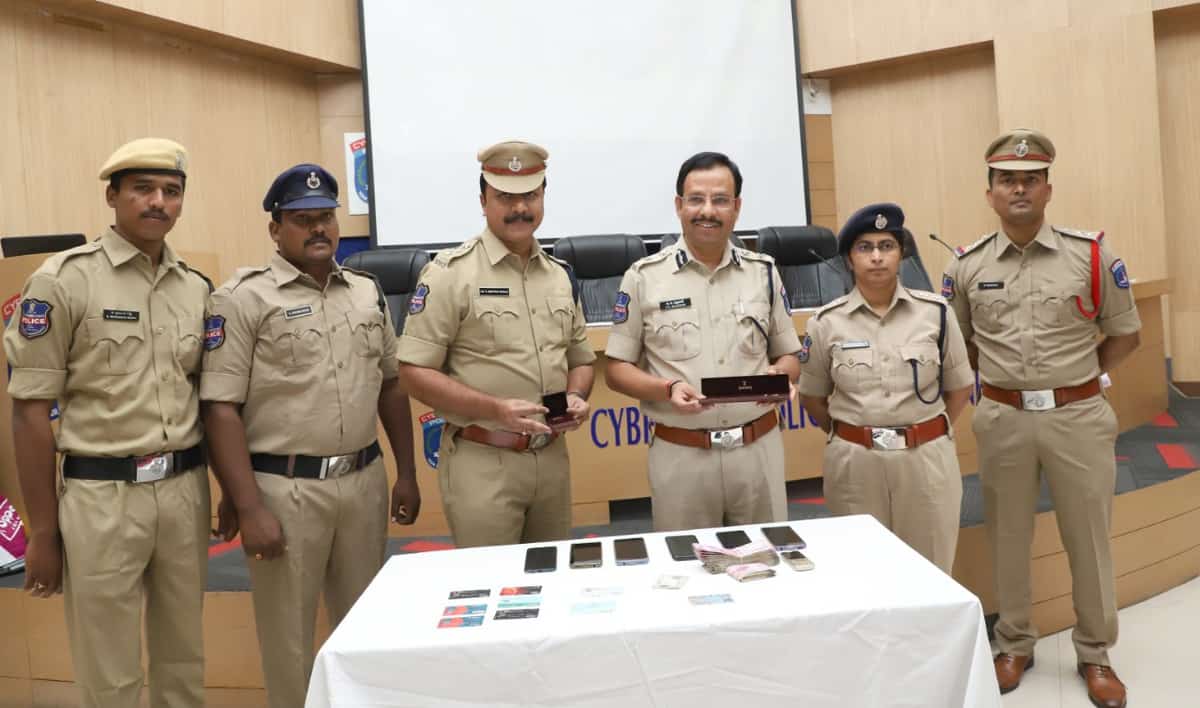Hyderabad: The Cyber Crime Cell of Cyberabad Commissionerate has busted a countrywide network of crooks on Wednesday who had duped more than a thousand people by posing as customer care representatives of banks.
The police have arrested a five-member gang that was involved in online cheating from Jamtara District of Jharkhand State for cheating a doctor to the tune of more than Rs 5 lakh by collecting confidential bank details by sending phishing Google link.
The gang of six has been identified as Sanjay Kumar Mandal alias Babloo who is absconding, Ram Kumar Mandal, Jamruddin Ansari, Jitendra Mandal, Birendar Kumar Mandal, and Rohit Raj.
The police have seized Rs.2.66 lakh, one gold chain, a pendant set of 12 grams and 3 mobile phones.

Jamtara, a tiny village, has emerged as one of the biggest cybercrime hubs in the country. Police from various states, including cybercrime cops from Hyderabad, have been making rounds to this Jharkand village looking for suspects.
A series of banking frauds has been witnessed in Jamtara. The members of the gang by posing as bank representatives ask people for their account details and in turn loot large sums of money.
Cyberabad police commissioner, V.C. Sajjanar revealed that, Sanjay Kumar Mandal who is the master mind behind the cyber frauds from Jamtara sent bulk messages as “Dear SBI Customer Your Saving Ac/Debit Card Service block on 21/10/2019 due to Not Complete March closing Transaction Statement and KYC verification details is Not delivered in –RBI Mumbai to Reactivate Your AC/ please Submit today..KYC details by visiting the link click below. If anyone responds to the message by opening the Google view form link and furnish bank account credentials believing it to be genuine.
The gang came on the police radar after an eminent doctor of Hyderabad on 23rd October lodged a complaint with the Cyber Crime Cell of losing Rs.5.29 lakh.
How do they operate?
Step 1: Crooks sent bulk messages to unsuspecting clients posing as bank officials and ask for one-time password, credit/debit card number, CVV number, expiry date, secure password, internet banking, ATM PIN, login ID and password.
Step 2: Reasons given include blocking of debit card; reactivation of account/card; redemption of reward points and; linking account with Aadhaar etc.
Step 3: Details are then used to conduct online transactions
Step 4: Money transferred to e-wallets and gift vouchers are purchased. The gang members purchase gold ornaments by using the same gift vouchers.
A probe revealed that the money was transferred to e-wallets registered through phone numbers procured on fake identity cards.
Sajjanar, in an advisory to the public, said:
- Don’t respond to such calls/mails seeking information related to bank details or debit/credit card.
- Visit concern website of Mobile Wallet/Booking Website/E-Commerce for customer care details, instead of searching on Google.
- Don’t forward UPI registration codes which are sent by cyber fraudsters.
- Don’t share any bank details in Google ViewForm links

